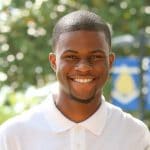| Department: | |
| Hours Required: | 120 |
| Categories: | Major, Undergraduate |
| Delivery: | On-Campus |
The Engineering Physics bachelor’s degree with science sub-plan is versatile and designed to provide students with a solid foundation in physics, mathematics and core engineering concepts, all of which are necessary to pursue graduate work in multidisciplinary complex areas. The curriculum leaves students with a variety of career choices. Graduates are able to seek innovative careers in industry, typically in research and development where problem-solving skills and an understanding of engineering are necessary, while at the same time, it provides a firm foundation for the pursuit of graduate studies in interdisciplinary engineering or physics topics at esteemed research universities. To name a few, our graduates may continue their education in advanced engineering and physics programs such as microelectronics, photonics, nuclear engineering, biomedical engineering, biophysics, radiation physics, nanotechnology or any discipline where the principles of physics are applied.
Learning Goals
- Our graduates effectively communicate scientific knowledge.
- Our graduates have the knowledge to make informed and ethical scientific decisions.
- Our graduates utilize appropriate quantitative skills in making decisions.
- Our graduates demonstrate the information literacy required for scientific study.
- Our graduates possess the knowledge and skills in engineering and the physical sciences to be successful.
Perry Grant
After graduating from SAU with a BS in Engineering Physics Science Option in May 2011, Perry completed a master’s degree in Microelectronics-Photonics at the University of Arkansas in 2013, and is currently finishing his final year as a PhD candidate in the Microelectronics-Photonics program at the University of Arkansas. His research is on the Molecular Beam Epitaxy growth of III/V-Bi materials and growth of GeSn materials using an Ultra-high vacuum Chemical Vapor Deposition (UHV-CVD) chamber.
Beyond his studies and research, Perry was recently named Vice President of Arktonics, LLC, a start-up company based on technology being developed at the University of Arkansas. His position with this company entails putting together a business plan and competition in business plan competitions within the next year, maintaining the UHV systems, and writing proposals for upcoming funding opportunities.
Nishan Shrestha
Nishan graduated with a double degree in Engineering Physics Science Option and Mathematics from SAU in May 2013, he completed master’s degree in Medical Physics and is currently pursuing a PhD in Physics at Oklahoma State University.
Nishan’s current research goal is to develop a new 2D dosimetry system based on Optically Stimulated Luminescence and Radio Photo Luminescence for quality assurance and dose verification in treatment planning during radiation therapy. After getting his degree, he hopes to become a medical physicist and work in a hospital to make treatment plans and diagnoses for cancer patients.
Darryl Webb III
Darryl graduated from SAU in May 2016 with a BS in Engineering Physics Science Option and Mathematics, and was honored with the Hall of Fame TRIO Achiever Award for his work as a student tutor. Darryl is expected to earn a master’s degree in Mathematics from the University of Arkansas this spring, and will be pursuing his PhD in Mathematical Education at the University of Arkansas.
While he was a student at SAU, Darryl was able to work with Dr. Bachri on a Space Radiation and Microgravity project that allowed him to experience hands-on research with NASA, which went arm-in-arm with his dream of working at NASA Ames Center of Nanotechnology (CNT) or the NASA Space Science Enterprise (SSE).
Kahli Remy
During her undergrad career at SAU, Kahli majored in Engineering Physics Science Option and completed two summer internships, one at Lawrence Berkeley National Laboratory in particle physics and one at Edwards Air Force Electric Propulsion Laboratory.
Kahli’s internships, as well as being a supplemental instructor for Physics I and II, prepared her well for graduate school, and after graduating from SAU in May 2013 she headed straight to graduate school at Oklahoma State University. She has since completed a master’s degree in Medical Physics, and is currently pursuing a PhD in Physics in the field of radiation and dosimetry.
Kahli recently presented her research in Germany to the 18th Solid State Dosimetry Conference in Munich. After graduate school, she hopes to go into a residency program and then eventually become a medical physicist, where she’ll develop and administer radiation treatments in oncology.
Note: A minimum grade of C is required for all courses in the curriculum.
University Requirement (2 hours)
GSTD 1002 – Freshman Seminar
General Education (18 hours)
English Composition (6 hours)
Fine Arts/Humanities (6 hours)
U.S. History/Government (3 hours)
Social Science (3 hours)
Note: 17 hours of mathematics, biological science, physical science, social science, and fine arts/humanities requirements are included in the major.
Chemistry (8 hours)
CHEM 1023 – University Chemistry I and CHEM 1021 – University Chemistry I Lab
CHEM 1123 – University Chemistry II and CHEM 1121 – University Chemistry II Lab
Physics (26 hours)
PHYS 2203 – University Physics I and PHYS 2201 – University Physics I Lab
PHYS 2213 – University Physics II and PHYS 2211 – University Physics II Lab
PHYS 3033 – Electromagnetism
PHYS 3053 – Modern Physics
PHYS 3113 – Advanced Physics Lab
PHYS 4013 – Optics
PHYS 4043 – Analytical Mechanics
PHYS 4053 – Quantum Mechanics
Engineering (30 hours)
ENGR 1023 – Introduction to Engineering and ENGR 1021 – Introduction to Engineering Lab
ENGR 1212 – Engineering Graphics
ENGR 2033 – Electrical Circuits I and ENGR 2031 – Electrical Circuits I Lab
ENGR 2143 – Statics
ENGR 3003 – Fluid Mechanics
ENGR 3013 – Thermodynamics
ENGR 3023 – Heat Transfer
ENGR 3043 – Mechanics of Materials
ENGR 3073 – Engineering Economics
ENGR 3101 – Solid Mechanics Lab
ENGR 3211 – Thermal Fluid Science Lab
ENGR 3163 – Computer-Aided Design and Analysis
ENGR 2020 – Engineering Exams *
*Engineering students must register for this course each fall and spring semester. It will be used as an exam period for all Engineering and Physics courses at the sophomore level and above.
Mathematics (19 hours)
MATH 1525 – Calculus I
MATH 1545 – Calculus II
MATH 2563 – Calculus III
MATH 2753 – Linear Algebra
MATH 3033 – Differential Equations
Computer Science (8 hours)
CSCI 2103 – Computer Science I and CSCI 2101 – Computer Science I Lab
CSCI 2113 – Computer Science II and CSCI 2111 – Computer Science II Lab
Electives (6 hours)
6 hours of upper-level Engineering, Physics, or Mathematics electives




